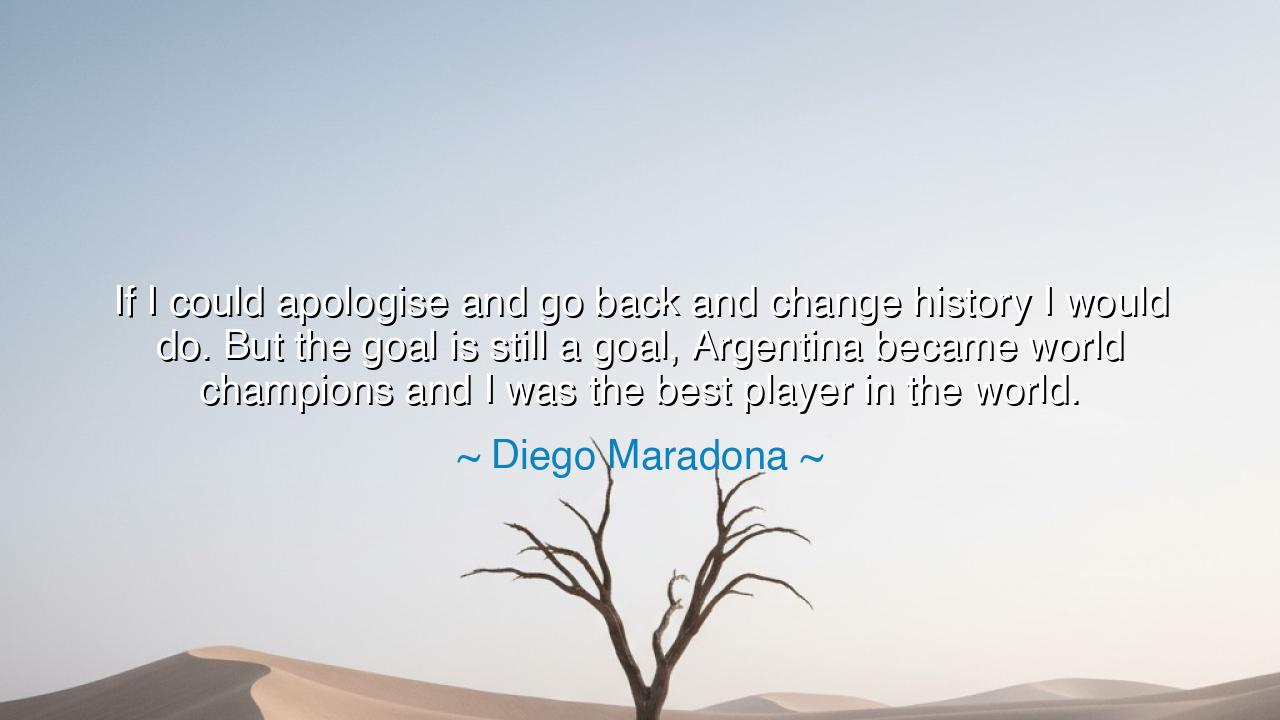
If I could apologise and go back and change history I would do.
If I could apologise and go back and change history I would do. But the goal is still a goal, Argentina became world champions and I was the best player in the world.






“If I could apologise and go back and change history I would do. But the goal is still a goal, Argentina became world champions and I was the best player in the world.” — Diego Maradona
Listen, O lovers of glory and seekers of redemption, to the words of Diego Maradona, a man both blessed and burdened by the divine fire of genius. In this confession, he stands as a mortal touched by immortality — a man who knew both triumph and temptation, greatness and guilt. When he speaks of changing history, he recalls that infamous moment in 1986, in the quarter-final between Argentina and England, when he scored the goal forever remembered as the “Hand of God.” It was a moment that shook the world — half deceit, half destiny. The hand of man reached for heaven, and for a brief instant, it touched eternity.
The origin of this quote lies in the aftermath of that moment — an act both condemned and celebrated. Maradona, whose left foot could weave magic as though guided by angels, had scored with his hand, unseen by the referee. When the truth was revealed, the world erupted. To some, he was a sinner; to others, a saint. Yet, in the same match, only minutes later, he scored what many call the greatest goal in football history — dribbling past five defenders, as if dancing between fate and forgiveness. It was as though the universe itself sought balance: one goal of controversy, another of pure creation. And when he says, “the goal is still a goal,” he accepts both — the shadow and the light — as part of his legend.
Maradona’s words carry the weight of human contradiction. He admits his fault — “If I could apologise and go back, I would” — yet he also recognizes that the deed, once done, becomes woven into the fabric of time. He cannot undo the act, nor can he erase its consequences. Argentina lifted the World Cup; history was written in their name. The lesson he offers is not one of pride, but of acceptance: that once we act, we cannot rewrite the past — we can only understand it. Every choice, noble or flawed, becomes part of who we are. To deny it is to deny our own humanity.
In these words, we hear echoes of the ancients. Think of Achilles, whose rage led to both glory and ruin in the Trojan War. He too might have wished to change history — to spare the friend he doomed and the fate he sealed — yet his deeds could not be undone. His legend was born not from perfection, but from the totality of his being: his brilliance, his pride, his grief. So too with Maradona, whose art and error were inseparable. The same passion that drove him to brilliance also tempted him toward hubris. Yet without that fire, he would not have been the best player in the world. In this, we see a reflection of all humanity — imperfect, striving, luminous, and flawed.
Maradona’s words also reveal a truth about forgiveness and legacy. He cannot return to the past, but he can face it without fear. The goal, once scored, belongs not to him but to history; it has become a symbol larger than the act itself. It tells of ambition, of daring, of the thin line between sin and genius. In this paradox lies the essence of greatness — for true legends are not spotless; they are human beings who dared to err in the pursuit of glory. To live greatly is to risk greatly. To play with the hand of God is to know the burden of being human.
What lesson, then, should we take from this? It is that remorse without self-destruction is wisdom. To regret what was wrong is noble; to be imprisoned by it is folly. We must learn, as Maradona did, to look upon our past with both humility and courage. The goal — whatever it may be in your life — has been scored. You cannot unmake it, but you can learn from it. And if you have achieved greatness, do not deny your mistakes, for they are the soil from which your victories have grown. History cannot be changed, but destiny can still be shaped.
So remember, O listener, that the world’s heroes are not angels but flawed mortals who dared to live fully, to act boldly, to embrace both their triumphs and their transgressions. Maradona’s voice reminds us that perfection is not the measure of greatness — honesty is. Admit your failings, own your victories, and walk forward. For as he said, the goal is still a goal — and though you may wish to change the past, the true test is to rise beyond it. History is written once; destiny is written every day.






AAdministratorAdministrator
Welcome, honored guests. Please leave a comment, we will respond soon